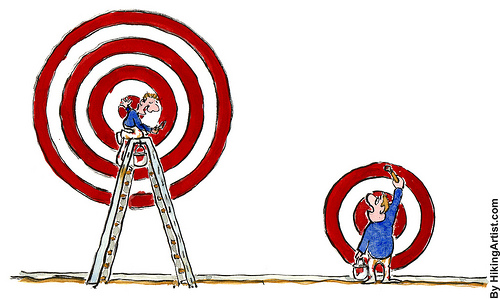
In the first two articles of this series, I covered two reasons my first business failed:
- I was in business to serve my muse, not my clients.
- I believed that people who could afford my work were not my tribe.
Today, let’s look at the third reason: the lack of a specific financial goal.
Money matters, especially when it’s not about the money
If the idea of a financial goal makes your head swim or raises resistance, I understand. When you work for yourself because you love what you do, it feels weird to make it about the money.
But money matters whether you want it to or not. If you rely on self-employment for an income (or want to), money determines your ability to stay in business. But it’s about more than just the bottom line.
Money, or the lack of it, affects your confidence. It colors the attitude you have toward potential clients. (Imagine a conversation with a potential client when you have no money worries. Now imagine the same conversation when you’re sweating your bills. Which way would you prefer to show up?)
Money determines how much you can invest in self care and professional development. The more you care about the quality of your work, the more important it is to make those investments.
Finally, if you exist in a money fog, your business is shrouded in fog, too. That makes it hard to navigate everything from pricing to equipment purchases to paying taxes. The resultant money worry is stressful and distracting.
So even if you’re not in it for the money, money matters.
Earning a living from self-employment is a creative activity
Another reason it’s important to set a financial goal is that it’s a critical piece of the creative process.
A consistent stream of income doesn’t just happen. It’s created the same way you create anything: by defining what you want to create, assessing current reality, and taking action to close the gap.
You can’t create what you don’t define
Creating begins by defining the desired outcome. Yes, serendipity comes into it. But how do you recognize what is serendipitous if you don’t know what you want to begin with?
When you establish a specific financial goal, you are declaring to both your conscious and unconscious mind that you intend to create a certain amount of income. It’s entirely different from muddling through from month to month, hoping to make ends meet. (If that’s all you set out to do, that’s all you’re likely to get.)
How to create a financial goal when it’s not about the money
So how do you set a financial goal?
Start by making a list of all your regular expenses. Look up actual amounts whenever possible. The more specific and accurate you are, the more powerful your goal will be.
(Notice if you’re thinking this is too much work. Then ask yourself if earning a really good living from work you love is worth an hour or two of research.)
Next, dream. What things are you not currently paying for that you need in order to be truly comfortable? Include things like insurance, self care (massage, anyone?), and holidays. Add these to your list.
Now, account for contingencies, profit, savings, and taxes. Contingencies are unexpected expenses. Profit lets you reinvest in yourself and your business. Savings and taxes are self-explanatory (though often Accidental Entrepreneurs forget to plan for them).
I suggest you add at least 30% to the total of expenses and dreaming for contingencies, profit, savings, and taxes.
Make a commitment
The final step in setting a financial goal is to commit to reaching it.
Are you comfortable with the goal you calculated? If so, making a commitment is easy. But for many people, the number they arrive at feels daunting or just plain weird.
That’s a sure sign that you’ve got money issues to work through. Identify the thoughts and fears that keep you from committing to your financial goal. Question them, noticing how you live when you believe them. Imagine how you would live without those thoughts and fears.
One tool you can use to work through your money stuff is The Work of Byron Katie. The Work is one of three blockbusting tools in the Profit Alchemy program. During the program, participants systematically and thoroughly shift their beliefs about making a profit while learning exactly what to do in their businesses to make that happen.
They’ll be shifting beliefs while taking daily action to create their financial goals. Along the way, they will develop confidence in their ability to earn a good living from self-employment. They are going to know they can rely on themselves to earn a good living.
It’s a powerful program. Click here to learn more and apply.
Image credit: HikingArtist.com via Flickr

